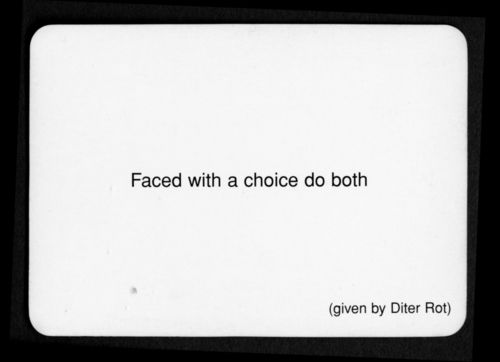The Holy Eno: Freedom from Subjectivity, Ambient Music, and the Force of Time
There is no genesis when it comes to Brian Eno. He has influenced music so absolutely, and at that, from so many angles that instead of listing the most impressive accomplishments or recounting some sort of history, I will, quite rhizomatically, drop into the center of a moving thing and discuss a story Eno recounted in an interview.
Brian Eno is deeply interested in a cappella music, practising singing together with a small group of people weekly. He describes the experience of a cappella singing as supremely different from the experience of singing Rock or Pop music. A Cappella is all about deconstructing the subjective and emerging as a fluid collective, even falls and rises in tones and intonations. Eno, being Eno, knows many famous muscians, and yet, he describes the experience of bringing a famous singer along to his a cappella meetings as somewhat disheartening, and something he would rather avoid. Popular musicians are not good at being in a choir. They are used to standing out, being the leading voice, and adding personal inflections to the words they sing. Most popular forms of music are centered strongly around a subject – the emotions of the lead singer front-and-center. Eno espouses the benefits of singing in a cappella and being able to surrender oneself to a larger group, lose sight of one's own subjectivity and enjoying the freedom and safety of moving as a 'one' voice, 'one' body, made out of the many.
This approach to music demonstrates Eno's dislike of the traditional, arboreal, and hierarchical structures of music: strict divisions of harmony, bass, and melody, and strict roles each instrument plays within this structure. Eno grew to fame as a member of Roxy Music, and yet, though this band made mostly straight-forward music, his approach to music was already experimental. After all, it was only 1971, and yet Eno's role in the band was to be the "treator of sound", to mess around with sound and manipulate its feedback – live, similar to the ways in which Robert Henke's Ableton software allows musicians to do 40 years later. This complex and rhizomatic approach to music clashed and stretched the conceptions of Rock, deterritorializing its configurations into new directions, this combination especially apparent in his early solo albums. In Here Come the Warm Jets, for example, Eno enlists a large cast of characters on the basis of their musicianship being "incompatible" and directs them not to shy away from accidents. He lists invented instruments such as "snake guitar", and creates lyrics by singing nonsensical syllables to his back-tracks, stretching out their sound until they form words.
This attitude to accidents, allowing the flow to guide the documentation rather than directing sound before it occurs, democratizes sound – relaxes the hierarchy between instruments. Of course, Eno also achieved this in other ways, infamously coining and inventing ambient music, when he was hit by a taxi in the winter of 1975.
Ambient music, taking cue from Satie, is atmosphericn. It does not demand attention but accentuates the listener's presence in the moment he already finds himself in. Ambient music can be tuned into at will, and merits being taken seriously (unlike, Muzak, for example, which only exists as background noise), but does not demand constant attention from its listeners. Listeners are encouraged to get lost in the textures of sound, listening to loops form and fall away in the same mode as one might watch the sky for shapes in clouds. Ambient music is focused on the color of sound.... the textures, little
ridges in tone, and this experience of zoning in and out, listening to a song an hour long – just a loop reworked, allows for the listener to become aware not only of the sounds, but also of time as it passes between notes, as it passes between stretches of sound, until you look up from your screen and realize you've been on some far away beach, playing Music for Airports for an hour.





